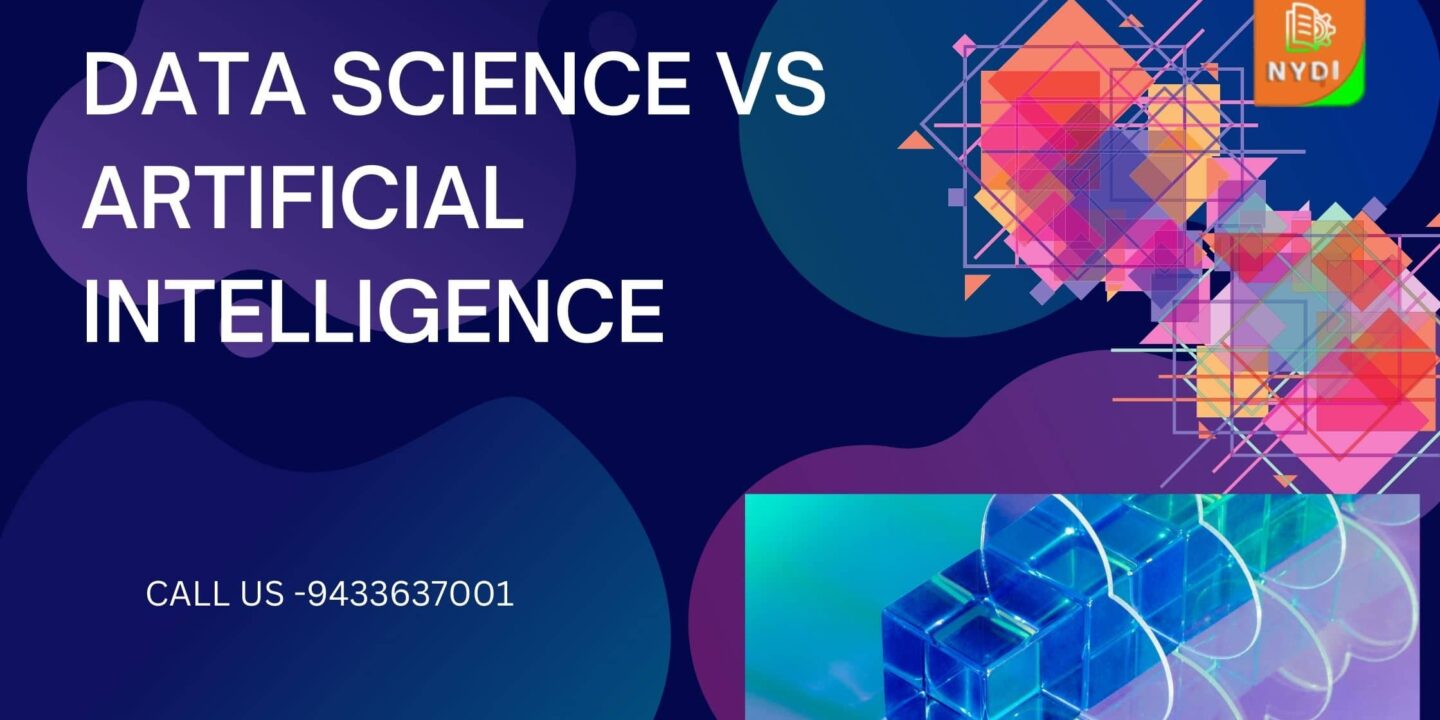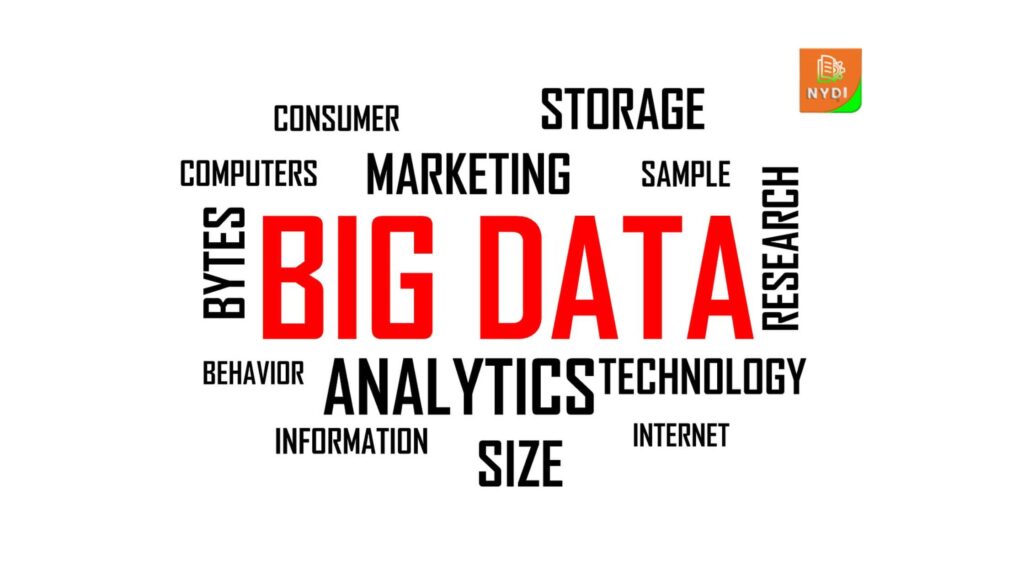
In the innovation scene, “Data Science” and “Artificial Intelligence” as often as possible develop in talks, starting interest almost their likenesses and qualifications. In spite of showing up alike at first, these two spaces epitomize isolated disciplines with particular points, approaches, and employments. Getting a handle on the contrasts between information science and AI — or information science vs fake insights — is imperative for tackling their full potential viably. This investigation points to shed light on each field’s complicated points of interest and special characteristics, clearly understanding their individual parts and commitments to the tech landscape.

What Is Data Science?
Data science coordinating differing procedures, calculations, and strategies to infer experiences and understanding from both organized and unstructured information. It’s a field that ranges numerous disciplines, leveraging factual examination, machine learning, information mining, and visualization strategies. This approach makes a difference in distinguishing designs, patterns, and connections inside endless datasets. Information science points to decipher crude information into noteworthy bits of knowledge to illuminate decision-making, drive development, and optimize forms over diverse domains.
Data science combines arithmetic, measurements, computer science, and space skill to handle complex explanatory issues. Information researchers utilize programming dialects such as Python, R, and SQL to control information, construct prescient models, and perform factual examination. They too utilize instruments and strategies such as information cleaning, include building, and show validation.

Data science finds applications over different businesses and divisions, counting fund, healthcare, retail, showcasing, and fabricating. In back, information researchers analyze advertise patterns, client behavior, and chance variables to illuminate venture choices and create algorithmic exchanging techniques. Information science is moreover utilized for prescient analytics, malady determination, and personalized treatment plans based on persistent information and therapeutic records.
Data science is basic in leveraging the tremendous sums of information produced in today’s computerized age to extricate important bits of knowledge, drive development, and pick up a competitive advantage in different fields.
Data Science Applications
Data science applications span different businesses and divisions, significant in leveraging information to extricate bits of knowledge, drive decision-making, and improve forms. Here are a few key zones where information science finds broad applications:
1.Trade Analytics
Data science is broadly utilized in trade analytics to analyze client behavior, advertise patterns, and deals figures. By mining and analyzing information from different sources, such as client exchanges, social media intelligent, and site activity, organizations can pick up profitable experiences to optimize methodologies, move forward client engagement, and drive income growth.
2.Healthcare
Data science has transformative potential in healthcare, where it is utilized for prescient analytics, malady conclusion, and personalized treatment plans. By analyzing electronic wellbeing records (EHRs), therapeutic imaging information, and genomic information, information researchers can create prescient models to recognize at-risk patients, prescribe personalized treatment regimens, and move forward quiet outcomes.
3.Finance
Data science is utilized in chance evaluation, extortion location, and algorithmic exchanging in the budgetary segment. Information researchers can create models to foresee market patterns, distinguish false exercises, and optimize venture procedures by analyzing authentic market information, client exchange designs, and credit chance factors.
4.Marketing
Data science is vital in marketing by empowering focused on promoting, client division, and assumption investigation. By analyzing client socioeconomics, buy history, and online behavior, organizations can tailor promoting campaigns to particular client portions, distinguish developing patterns, and degree campaign effectiveness.
5.Manufacturing
Data science is utilized in fabricating for prescient support, quality control, and supply chain optimization. By analyzing sensor information from generation gear, information researchers can predict gear disappointments some time recently they happen, optimize generation forms to minimize surrenders and optimize supply chain coordinations to diminish costs and progress efficiency.
6.Energy
Data science is progressively utilized in the vitality segment for vitality estimating, request reaction optimization, and lattice administration. Information researchers can create models to foresee vitality request, optimize vitality generation and dispersion, and make strides vitality effectiveness by analyzing authentic vitality utilization information, climate designs, and showcase trends.
7.Transportation
In transportation, information science is utilized for course optimization, activity administration, and prescient upkeep. By analyzing information from GPS gadgets, activity cameras, and vehicle sensors, information researchers can optimize transportation courses to minimize blockage, foresee activity designs, and recognize upkeep needs.
What Is Artificial Intelligence?
Artificial Insights alludes to the creation of machines that can copy human intelligence, permitting them to carry out exercises that ordinarily require human cognitive forms. These frameworks are built to duplicate behaviors associated to people, such as learning, understanding issues, making choices, and comprehending normal dialect. AI points to create gadgets competent of detecting their environment, getting a handle on the setting, and adjusting their behavior freely to fulfill specific goals.

AI envelops different innovations, counting ML, NLP, computer vision, mechanical autonomy, and master frameworks. These innovations empower AI frameworks to prepare and analyze huge volumes of information, recognize designs, make forecasts, and associated with people and their environment in a human-like manner.
Machine learning, which falls beneath the broader category of manufactured insights, concentrates on making calculations and models that enable machines to determine information from information and continuously upgrade their capabilities without particular programming. Administered, unsupervised, and support learning are common approaches utilized in ML to prepare models and empower them to perform particular errands, such as picture acknowledgment, dialect interpretation, and proposal systems.
Natural dialect preparing (NLP) is another key component of AI, which includes instructing machines to get it, decipher, and produce human dialect. NLP empowers AI frameworks to prepare and analyze content information, extricate meaning, and produce reactions in normal dialect, empowering applications like virtual associates, chatbots, and estimation analysis.
Computer vision permits machines to see and decipher visual data from the environment, such as pictures and recordings. AI-powered computer vision frameworks can recognize objects, recognize faces, identify irregularities, and analyze scenes, empowering applications such as independent vehicles, reconnaissance frameworks, and medical imaging analysis.
Robotics is another zone of AI that centers on creating shrewdly machines able of performing physical assignments in different situations. AI-powered robots can explore their environment, control objects, and associated with people and other robots, empowering applications such as mechanical mechanization, healthcare help, and look and protect operations.
Artificial intelligence is revolutionizing various businesses and divisions by empowering machines to perform assignments that were once elite to people, driving advancement, effectiveness, and efficiency over different spaces. As AI innovations proceed to development, they hold the potential to change how we work, live, and connected with the world around us.
Artificial Intelligence Applications
Artificial Intelligence (AI) applications are revolutionizing different businesses and spaces, changing businesses’ operations, improving effectiveness, and driving development. Here are a few key regions where AI finds broad applications:
1.Healthcare
AI revolutionizes healthcare by empowering progressed medical imaging examination, prescient analytics, and personalized pharmaceutical. AI-powered demonstrative frameworks can analyze restorative pictures such as X-rays, MRIs, and CT looks to help radiologists in recognizing variations from the norm and diagnosing infections precisely. Moreover, AI-driven prescient models can distinguish at-risk patients, suggest personalized treatment plans, and optimize clinic operations for moved forward quiet outcomes.
2.Finance
In the monetary division, AI is utilized for algorithmic exchanging, extortion location, and chance administration. Exchanging calculations fueled by AI can filter through showcase information immediately, pinpointing openings for exchanges and conducting them quickly and accurately. Also, AI-enhanced frameworks for identifying extortion can scrutinize exchange information to distinguish peculiarities demonstrative of suspicious exercises, hence anticipating false exchanges. This innovation is imperative in ensuring monetary teach and their clients.
3.Customer Service
The rise of AI has revolutionized client benefit by presenting virtual colleagues and chatbots. These apparatuses offer custom-made back 24/7, locks in with clients in conversational dialect, tending to questions, tackling issues, and autonomously conducting exchanges. This headway not as it were upgrades client satisfaction but moreover brings down commerce operational expenses.
4.Marketing
AI reshapes marketing methodologies by empowering focused on promoting, client division, and prescient analytics. AI-driven proposal motors can analyze client inclinations, buy history, and online behavior to convey personalized item suggestions and focused on notices, expanding transformation rates and maximizing ROI for showcasing campaigns.
5.Autonomous Vehicles
AI drives advancement in the car industry by creating independent vehicles that can explore streets, distinguish deterrents, and make driving choices independently. AI-powered self-driving cars utilize progressed sensors, computer vision, and ML calculations to see their environment, recognize activity signs, and react to changing street conditions, upgrading street security and efficiency.
6.Manufacturing
AI optimizes manufacturing forms by executing predictive upkeep, quality control, and supply chain optimization arrangements. AI-driven predictive support frameworks can analyze sensor information from generation hardware to foresee gear disappointments and plan support proactively, in this manner minimizing downtime and decreasing upkeep costs. Also, AI-powered quality control frameworks can precisely review items for defects and deviations from determinations, guaranteeing item quality and decreasing waste.
Cybersecurity
Combined with cybersecurity, AI empowers danger discovery, irregularity discovery, and robotized occurrence reaction. AI-driven cybersecurity arrangements can analyze arrange activity, recognize suspicious exercises, and moderate cyber dangers in real-time, securing organizations from cyberattacks and information breaches.
What Is the Difference Between Data Science and Artificial Intelligence?
Data science is the field that extracts experiences and designs from expansive information sources utilizing, e.g., statistics or machine learning while Artificial Intelligence points to make brilliantly frameworks able to perform human errands like choice making, problem-solving, and learning.
AI at that point applies calculations and models to construct frameworks that can act by themselves. Information Science incorporates the entirety information pipeline, from collection and cleaning up until examination stage. Whereas AI leverages information science strategies to learn models, the conclusion objective is to recreate human intelligence.
Data Science vs Artificial Intelligence: Key Differences
Data science and AI are frequently utilized traded but speak to distinct areas with distinctive techniques, destinations, and applications.

Definition
Data Science: Information science is an intrigue field centered on determining understanding and bits of knowledge from both organized and unstructured information through a variety of strategies, counting factual examination, machine learning, and information visualization.
Artificial Intelligence: Artificial intelligence includes programming machines to imitate human intelligence, permitting them to embrace exercises that as a rule require human cognitive capacities, counting learning, understanding issues, and making decisions.
Scope
Data Science: Information science centers on analyzing information to extricate experiences, recognize designs, and make expectations that can advise decision-making and drive advancement over different domains.
Artificial Intelligence: Artificial intelligence includes a broader scope, counting creating cleverly frameworks and calculations that can see their environment, get it setting, and make independent decisions.
Methodologies
Data Science: Information science utilizes factual examination, machine learning, information mining, and information visualization to prepare and analyze information, revealing noteworthy experiences and patterns.
Artificial Intelligence: Artificial intelligence utilizes assorted advances and approaches, such as machine learning, normal dialect preparing, computer vision, and mechanical technology, to imitate human-like activities and mental forms in machines.
Objective
Data Science: The essential objective of information science is to extricate bits of knowledge and information from information to drive decision-making, optimize forms, and reveal modern openings for advancement and growth.
Artificial Insights: It creates shrewdly frameworks and calculations to perform assignments independently, make choices, and adjust to changing situations without human intervention.
Applications
Data Science: Information science finds applications in assorted businesses and segments, including healthcare, fund, promoting, fabricating, and transportation. It is utilized for prescient analytics, client division, and handle optimization.
Artificial Intelligence: Artificial intelligence is connected over different spaces, counting healthcare, fund, client benefit, independent vehicles, and cybersecurity. It powers applications such as medical imaging examination, algorithmic exchanging, chatbots, self-driving cars, and danger detection.
Data Science vs Artificial Intelligence: Similarities
Here’s a comparison table highlighting the similarities between Data Science and Artificial Intelligence

| Aspect | Data Science | Artificial Intelligence |
| Use of Data | Both involve the analysis of data to extract insights and patterns. | Data is a fundamental component utilized in AI systems for training and decision-making. |
| Techniques | Both fields employ techniques like machine learning, statistical analysis, and data mining. | AI systems often utilize machine learning algorithms, commonly used in data science for predictive modeling and pattern recognition. |
| Goal | Both aim to enhance decision-making processes, drive innovation, and optimize operations through data-driven insights. | AI seeks to simulate human-like intelligence in machines to perform tasks autonomously, aligning with data science’s broader goal of leveraging data to derive actionable insights. |
| Applications | They find applications across diverse industries, including healthcare, finance, marketing, and manufacturing. | Both are applied in sectors such as healthcare (e.g., predictive analytics), finance (e.g., algorithmic trading), and marketing (e.g., personalized recommendations). |
| Interdisciplinary Approach | Both fields are multidisciplinary, drawing from domains such as mathematics, statistics, computer science, and domain expertise. | AI development often involves collaboration between data scientists, computer scientists, and domain experts to develop intelligent systems capable of autonomous decision-making. |
Data Science and Artificial Intelligence Careers
Data science has developed as one of the most sought-after career ways due to its significance over businesses and potential to drive trade victory through data-driven experiences. Here are a few common career ways inside the field of information science:
1.Data Scientists
Data scientists collect, handle, and analyze expansive datasets to extricate significant experiences and illuminate decision-making. They utilize measurable investigation, machine learning calculations, and information visualization procedures to reveal designs and patterns in data.
2.Data Analysts
Data analysts center on deciphering information to give profitable experiences and proposals to partners. They utilize factual examination and information visualization instruments to analyze information, distinguish patterns, and communicate discoveries effectively.
3.Machine Learning Engineers
Machine learning engineers plan, create, and convey machine learning models and calculations to fathom complex issues and computerize decision-making forms. They work closely with information researchers to prepare models, optimize calculations, and coordinated them into generation systems.
4.Huge Information Engineers
Data designing specialists center on creating and keeping broad information administration frameworks competent of overseeing endless information amounts. They build adaptable and successful information pipelines utilizing innovations such as Hadoop, Start, and Kafka. These pipelines are outlined for information capacity, preparing, and investigation, guaranteeing tall productivity and scalability.
5.Trade Intelligence Analysts
Business intelligence investigators analyze commerce information to give experiences and suggestions that back key decision-making. They utilize information visualization devices and dashboards to display information in a clear and significant organize for stakeholders.
Artificial intelligence drives development over different businesses, making a developing request for experts with ability in AI advances. Here are a few common career ways inside the field of counterfeit intelligence:
1.AI Engineers
AI engineers plan and create artificial intelligence frameworks and applications, counting machine learning models, normal dialect preparing calculations, and computer vision frameworks. They work on all stages of AI improvement, from information collection and preprocessing to show preparing and deployment.
2.Deep Learning Engineers
Deep learning pros center on making and applying deep neural systems for different assignments, counting recognizing pictures, interpreting discourse, and handling common dialect. They have skill in systems such as TensorFlow and PyTorch and are talented at optimizing models for execution and scalability.
3.Robotics Engineers
Robotics engineers plan and create robotic systems that can see their environment, make choices, and perform assignments independently. They work on equipment plan, sensor integration, and computer program improvement to make cleverly robots for different applications, including fabricating, healthcare, and transportation.
4.AI Research Scientist
AI investigate researchers conduct cutting-edge investigate in fake insights, investigating modern calculations, strategies, and applications to development the field. They distribute investigate papers, collaborate with other analysts, and contribute to creating modern AI innovations and methodologies.
5.AI Ethicists
AI ethicists center on the moral suggestions of fake insights advances, counting issues such as predisposition, reasonableness, straightforwardness, and responsibility. They work with policymakers, industry partners, and analysts to construct moral rules and directions for the capable improvement and arrangement of AI systems.
Conclusion
The investigation of Information Science vs Manufactured Insights has divulged the complicated relationship and unmistakable parts each field plays in the advanced mechanical scene. Information Science, centering on extricating experiences and information from information, serves as the basis for understanding designs and making educated choices. On the other hand, AI leverages these bits of knowledge to recreate cleverly behavior in machines, pushing the boundaries of what’s conceivable in computerization and shrewd technologies.
There are custom fitted ways to authority for those propelled to jump more profound and saddle the potential inside these energetic areas. Yearning information researchers can hoist their ability through the Information Researcher Master’s Program advertised by Simplilearn. This program covers the most basic angles of information science, from measurable investigation to profound learning, guaranteeing a well-rounded establishment for handling real-world information challenges.
Similarly, for those drawn to AI’s transformative control,NYD India Artificial Intelligence Design program presents an unparalleled opportunity. This course makes a difference learners with the information and aptitudes to plan, create, and send AI frameworks, from machine learning models to neural systems, planning them to lead development in different businesses.












